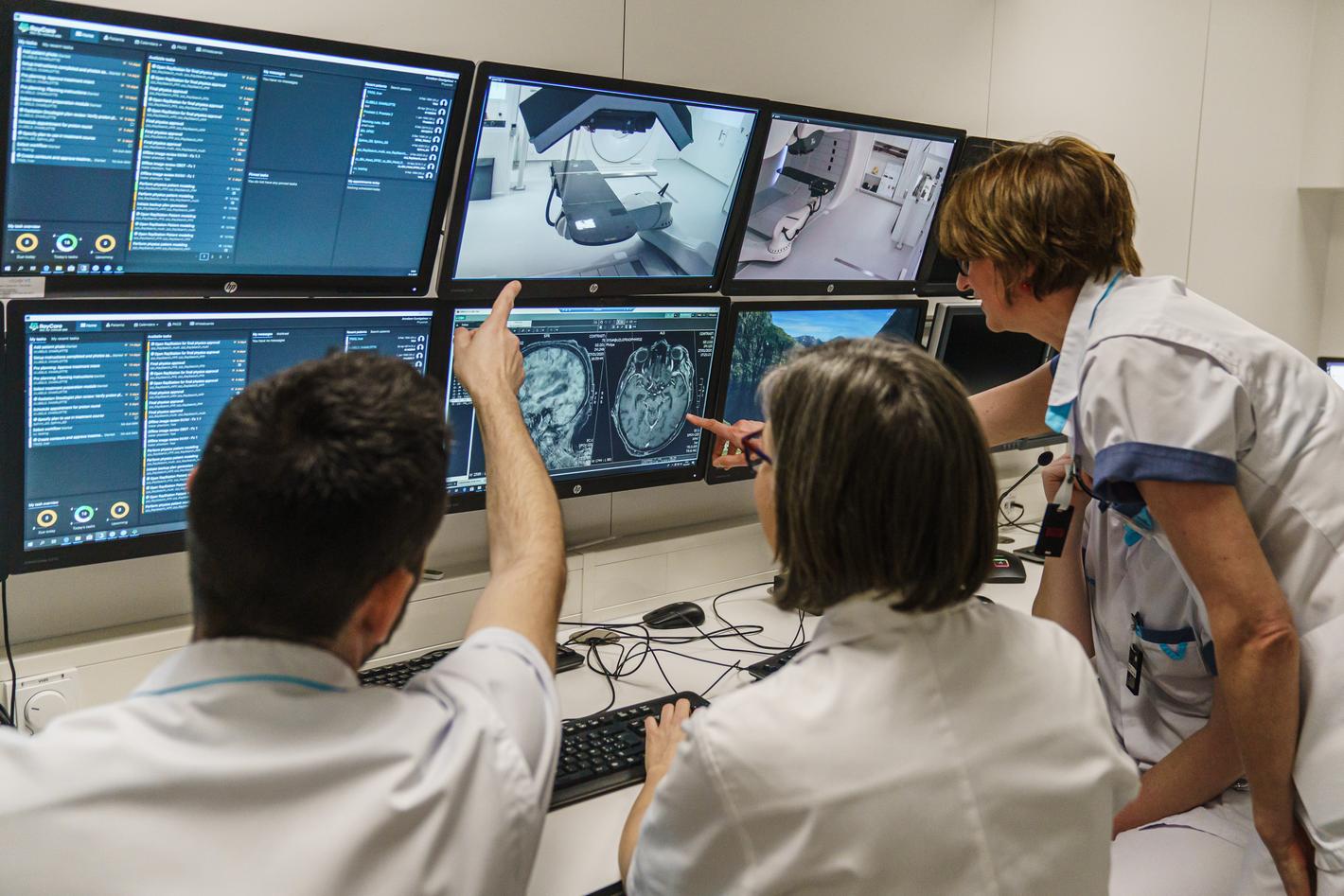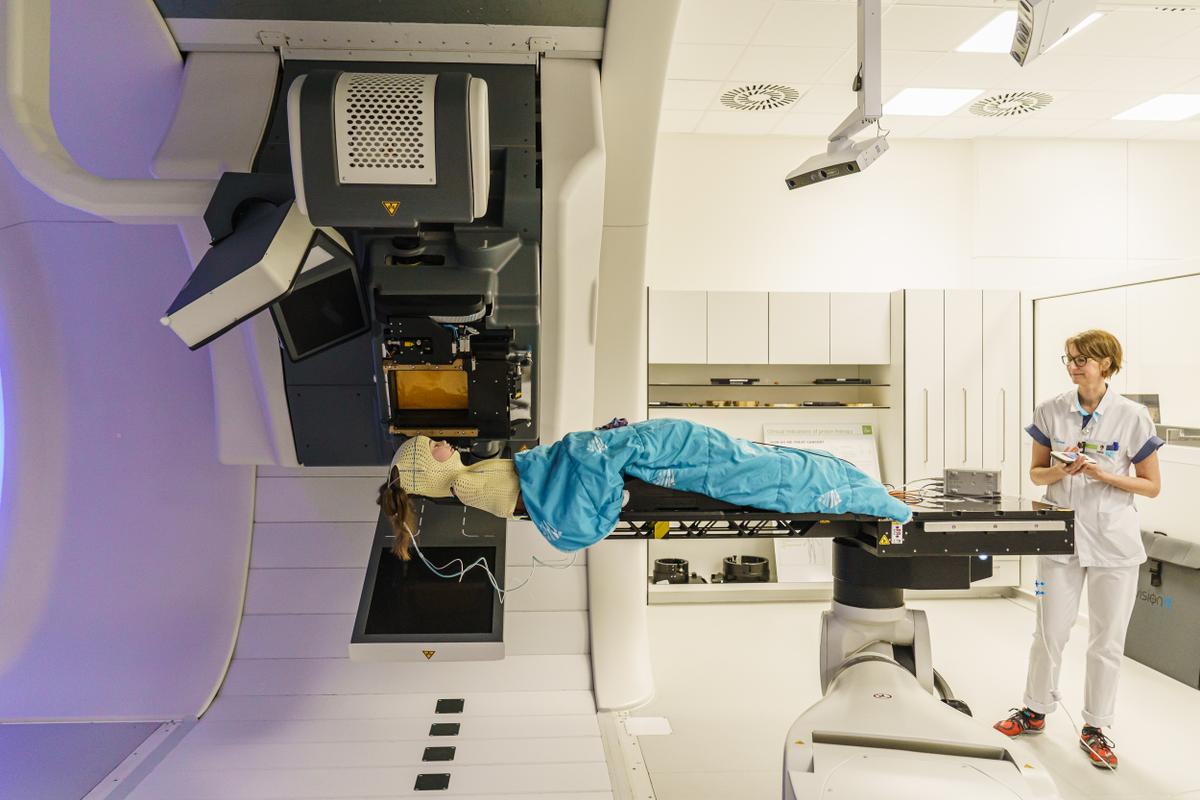Construction of the first proton therapy centre in Belgium began in the autumn of 2016 and in the summer of 2020 the Leuven proton therapy centre PARTICLE opened its doors. The first patient, a young man with a rare brain tumour received radiation treatment on 22 July 2020. Since then 7 more patients have been treated with proton therapy.
Proton therapy is an innovative form of radiotherapy which targets malignant tumours with great precision, causing less damage to healthy tissue. The therapy is on the increase worldwide for the treatment of a number of cancers where it is particularly important to protect the surrounding tissues. For example children with cancer or adults with a tumour close to vital or vulnerable organs such as the brain or eyes.
Treatment no longer abroad
Until now, patients in Belgium who were eligible for proton therapy had to travel abroad for treatment, usually to Germany, France or Switzerland. The Belgian government reimbursed the costs of treatment, but for the patients the journey was a heavy burden. From now on, Belgian patients will be able to go Leuven to get treatment. An estimated 150-200 patients are eligible for proton therapy annually. That number could rise in the future if new treatment conditions for proton therapy emerge from clinical scientific studies.
The treatment of the first patients went smoothly, thanks to our enthusiastic care workers and medical radiations physicists, who have received extensive training in working with the new equipmentdr. Jean-François Daisne, head of the radiotherapy-oncology department at UZ Leuven
Two particle accelerators
Neighbouring countries such as the Netherlands, Germany, France, Italy, Spain, Switzerland and the UK have acquired their own proton therapy centres in recent years. The new proton therapy centre at the Gasthuisberg campus in Leuven is unique in Europe in that it consists of two parts: an area for treating patients and a separate bunker for carrying out high-tech research. Each bunker has its own particle accelerator or cyclotron. This puts PARTICLE a step ahead of other European proton therapy centres, where research has to be carried out in the evenings and at weekends because the radiation unit is in use for treating patients during the daytime. For the moment, only the radiation bunker for patients is in use; the research bunker will be put in use later this year.
Structural partnership
PARTICLE, short for Particle Therapy Interuniversity Centre Leuven, is a clinical and scientific partnership between six university hospitals and their network hospitals. It is a first for Belgium, as is the structural collaboration across the country’s language border.
UZ Leuven, KU Leuven, Cliniques universitaires Saint-Luc and UCLouvain hospitals are investing in the new treatment and research centre in collaboration with UZ Ghent, CHU-UCL-Namur, UZ Antwerp and UZ Brussels. The interaction with other non-university hospitals in Flanders and Wallonia also gives the partnership a wide reach: thanks to the networks of the five university hospital hubs PARTICLE can reach 80 percent of all radiotherapy centres in Belgium. And although the patient travel to Leuven for proton radiation, their own doctor remains closely involved.
Collaboration is an evolution we are seeing everywhere across the clinical and scientific world. Sharing financial input and scientific knowledge is the best way of delivering innovative technologies to our patients in a sustainable way.prof. dr. Wim Robberecht, CEO UZ Leuven
The high-tech centre is situated on the Gasthuisberg Health Sciences campus, close to the radiation oncology Department, the radiology department, the medical imaging research centre and the nuclear medicine department. The proton therapy machines were supplied and installed by IBA, the market leader in proton technology. The facility meets the most stringent safety and radiation protection stan(dards.
(Read more under the picture)

(read more under the picture)
Dr. Jean-François Daisne, head of the radiation oncology department at UZ Leuven: “Sometimes there are healthy, radiation-sensitive tissues too close to the tumour; it’s almost impossible to radiate those tumours without endangering the patient’s quality of life. Proton therapy offers more protection for the healthy tissues, but also a lower risk of causing a new cancer as a result of the radiation itself. The treatments of the first patients went smoothly, thanks to our enthusiastic care professionals and medical radiation physicists, who have received extensive training in working with the new equipment.”
Dr. Xavier Geets, head of radiation oncology at Cliniques universitaires Saint-Luc: “A partnership between six university hospitals across the language border has never before been seen in Belgium. All experts involved come together each Monday to discuss one or more patient cases.”
Professor Wim Robberecht, CEO of UZ Leuven: “Collaboration is an evolution we are seeing everywhere across the clinical and scientific world. Sharing financial input and scientific knowledge is the best way of delivering innovative technologies to our patients in a sustainable way. PARTICLE is a great example of high-tech innovation which ensures focus on the patient.”
Mr. Renaud Mazy, CEO of Cliniques universitaires Saint-Luc: “The patients were the biggest motivation for joining forces in this project. PARTICLE has an tremendous added value for sick children, their parents, brothers and sisters. The financial contribution of Saint-Luc and UC Louvain is mostly from private gifts to the Fondation Saint-Luc, to support the start of proton therapy in Belgium. In comparison to centres abroad, this proton therapy centre is unique because it is embedded in a large university hospital, with direct access to the MRI scanner and anaesthesia facilities. The patient-friendly setting is a great bonus.”
